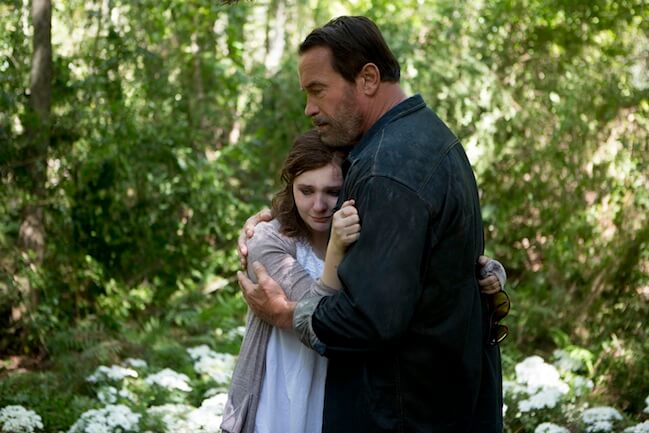‘Maggie’ There is no ass-kicking in the Arnold Schwarzenegger-starring zombie drama “Maggie,” nor basic horror staples, nor a sense of humor, nor the colors red, blue, green, purple and orange. It is a dour and punishing affair, so dark its images can barely be parsed even courtesy the brightest projector bulb. It’s fully, and mostly admirably, committed to its downer image of the zombie-pocalypse, and how it affects one family. It borrows the language of the smarter zombie films, notably the ones by George A. Romero, which fully explore how a crumbling society would struggle to stay at least kicking in the face of overwhelming atrocity. But it removes all the fun parts Romero used as bacon around the bitter pill that was his bleak-o-rama vision. As such, “Maggie” exists in part to upset Ah-nuld fans, though even those coming to gawk at the former Governator in full-on serious mode for the very first time will be surprised to learn it’s not so much about him. It’s really the story of Maggie (Abigail Breslin), a teen slowly, gradually, horrifically turning into one of the undead. Like all of us, she knows she’s going to die, but unlike most of us, she knows — in fact, is acutely aware — it’s right around the corner, and that part of her decay involves developing an unqunechable hankering for human flesh. She spends most of “Maggie” at her remote family farm, where even her early state (pale skin, mildly creepy eyes, one festering wound) has freaked out her siblings and soon-to-depart mother (Joely Richardson). Only Schwarzenegger’s Wade, her atypically burly everydad, sticks around, although his refusal to put her out of her misery increasingly seems more cruel than fatherly. And yet “Maggie” doesn’t latch onto this latter idea the way it could have, or perhaps should have. We’re told the process of turning zombie is more painful than anything imaginable, and it’s clear that pop is simply having trouble doing the unthinkable. But it never follows through on this idea like it should, and Wade sort of drifts out of the picture as it winds down. That’s a shame as Schwarzenegger plays him with real soul. He’s always been a limited actor, and he’s always known it, and even when trying something genuinely new he doesn’t stray too far from his comfort zone. But that works for his character, and for his performance. Schwarzenegger doesn’t shout or turn hammy; even his inevitable crying scene is understated. He’s a withdrawn hunk of granite, though Schwarzenegger finds a way to use his narrow stare, classically an instrument for intimidation, to convey bottomless sadness. At the same time we don’t really get the chance to know his character too well, in part because the screenplay — by someone who goes by the name “John Scott 3” — can’t figure out which way it wants to go. It has a lot of strong angles, but it won’t commit to one, and so it feels frustrating, in need of one more draft. It could stay with Wade and examine the mixture of humanity and selfishness that keeps him from ending his dying daughter’s life. (At times the film threatens to touch on the same dark ideas as 1972’s “Deathdream,” in which a mother is so relieved when her son, killed in Vietnam, suddenly returns home she doesn’t mind that he’s actually a zombie-vampire. But it’s as afraid to go there as Wade is to let go of Maggie.) Or it could stay with Maggie herself, very well played by Breslin. Instead it tries for some mixture of the two and winds up feeling insufficient, and its inability to engage with those who do quarantine or kill their bitten loved ones (including a local boy Maggie likes) gives it an air of bitter cynicism. Still, when it does engage with its ideas — such as Maggie’s friends staying in jokey mode, trying to do anything but address the idea of encroaching death — it feels just right. And it’s hard to be too hard on any movie with a noted Republican that opens with a clip from NPR.
Director: Henry Hobson
Stars: Arnold Schwarzenegger, Abigail Breslin
Rating: R
3 (out of 5) Globes
Review: ‘Maggie’ actually doesn’t do enough with serious Schwarzenegger

Roadside Attractions
Follow Matt Prigge on Twitter @mattprigge


















